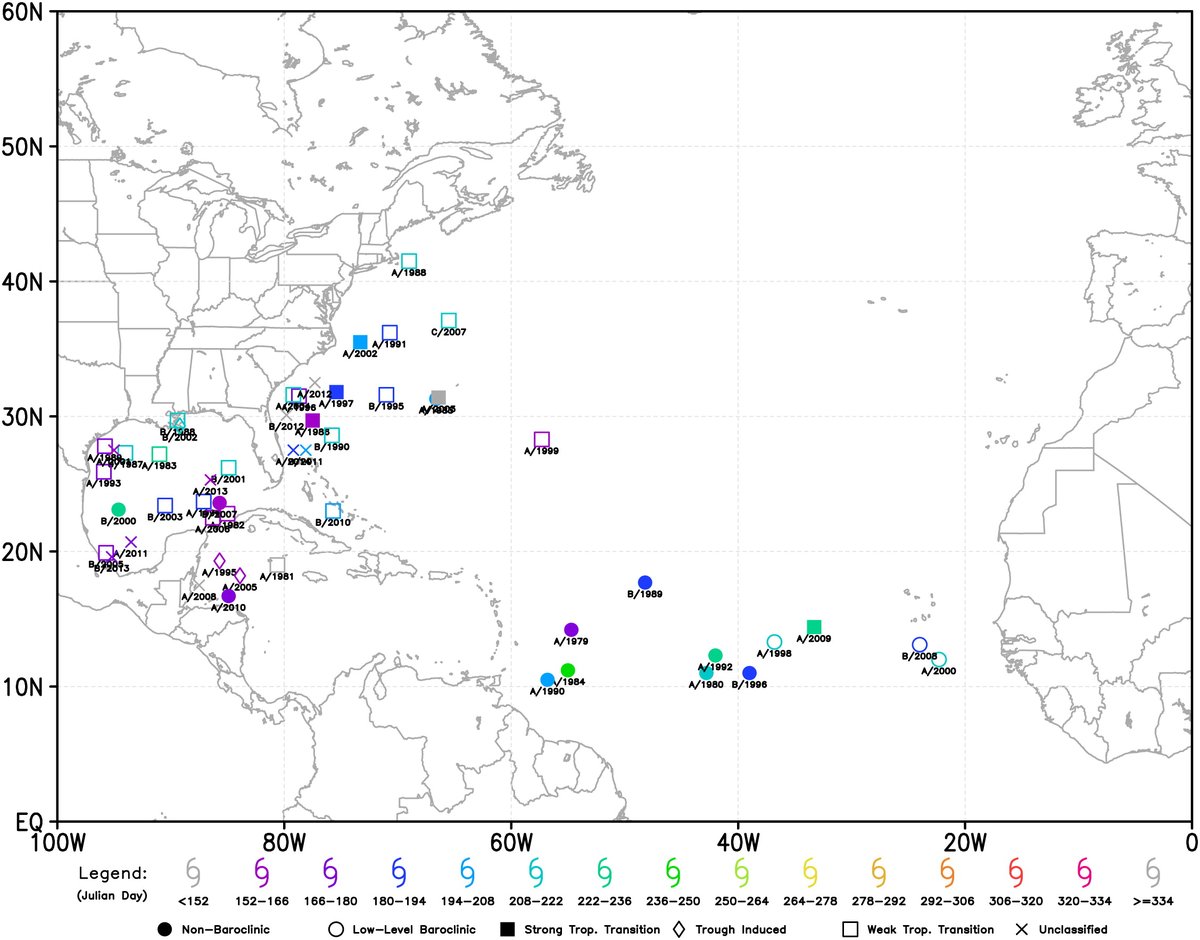A student in my group & I have published on Atlantic hurricane season length (Karloski & Evans 2016, #JClimate - https://journals.ametsoc.org/doi/full/10.1175/JCLI-D-15-0324.1),">https://journals.ametsoc.org/doi/full/... and the forecast potential for subtropical cyclone development north of the Bahamas this weekend has reignited the debate. A thread: (1/15) https://twitter.com/MichaelRLowry/status/1260427605427326977">https://twitter.com/MichaelRL...
To some extent, the debate rests on scientific definitions vs. public impacts. As @MichaelRLowry& #39;s tweet suggests, nearly all *hurricane* activity occurs well within the bounds of the existing season. Note my emphasis on hurricane: this implies a wind-speed threshold. (2/15)
A 2016 @capitalweather @wx_tiger article supports this, using Accumulated Cyclone Energy (ACE; proportional to max-wind squared) to show that despite the earliest 5% of ACE getting earlier, it& #39;s still mid-July before that threshold is crossed. (3/15) https://www.washingtonpost.com/news/capital-weather-gang/wp/2016/11/29/analysis-atlantic-hurricane-season-is-growing-longer/">https://www.washingtonpost.com/news/capi...
Looking at cyclone activity as a whole, this 2018 @capitalweather @wx_tiger/ @ericastaehling article suggests that 96.2% of tropical/subtropical cyclones occur between Jun 1-Nov 30, slightly < than the 97% on which the season was originally based. (4/15) https://www.washingtonpost.com/weather/2018/11/29/with-increasing-storms-atlantic-hurricane-season-needs-expand-begin-may/?itid=sf_local-weather">https://www.washingtonpost.com/weather/2...
Our 2016 #JClimate paper found no significant trend in the date at which the first 5% of storms formed between 1979-2014. (Jim Kossin& #39;s 2008 paper on season length only considers an extended main development region in the tropical Atlantic, not the whole basin.) (5/15)
Me, @wx_tiger, & a few others (I recall @DRmetwatch and @BMcNoldy chiming in before) have gone back and forth on this over the last few years. You have to refine the cyclone record to the first 1% - effectively, the first storm - to identify a trend in the season& #39;s start. (6/15)
When you& #39;re looking at individual storms, it& #39;s fair to ask the question of whether it& #39;s signal or noise. If it& #39;s signal, of what nature is the signal: anthropogenic climate or oscillatory climate? I don& #39;t think our historical record is long enough to definitely say. (7/15)
There& #39;s also the question of how should the hurricane season be defined. The ~97% of all activity definition ( http://blog.ametsoc.org/uncategorized/time-to-lengthen-the-official-hurricane-season/)">https://blog.ametsoc.org/uncategor... is subjective but reasonable (IMO). Should the season always meet that threshold, though? Is a 0.8% difference acceptable? (8/15)
That said, looking more toward public impacts, as our 2016 #JClimate paper (image below) and the earlier-referenced 2018 @capitalweather @wx_tiger/ @ericastaehling article demonstrate, most early-season cyclones form close to the United States and Mexico. (9/15)
While these cyclones are not particularly intense, they can bring heavy rain to coastal regions. While storm surge is responsible for the most cyclone-related fatalities, rainfall drowning occurs in more cyclones than any other cause: (10/15)
https://journals.ametsoc.org/doi/full/10.1175/BAMS-D-12-00074.1#">https://journals.ametsoc.org/doi/full/...
https://journals.ametsoc.org/doi/full/10.1175/BAMS-D-12-00074.1#">https://journals.ametsoc.org/doi/full/...
There are a few noteworthy examples of early-season cyclones that, despite being weak, were prolific rain producers; Allison in 2001 is a good example. Most early-season storms aren& #39;t like Allison, but some are, and we want the public to take them seriously. (11/15)
Related to this is the public messaging concern. Most hurricane-related outreach & preparedness efforts occur in April/May when many early-season storms occur. Would an earlier hurricane season start help with this? Maybe. How much? Not sure - but we& #39;ll come back to that. (12/15)
The nuanced position on this debate that I& #39;ve developed over the years is perhaps a good summary of this thread: whether the start of the hurricane season should be moved up largely depends on your belief of what the hurricane season should cover... (13/15)

 Read on Twitter
Read on Twitter


